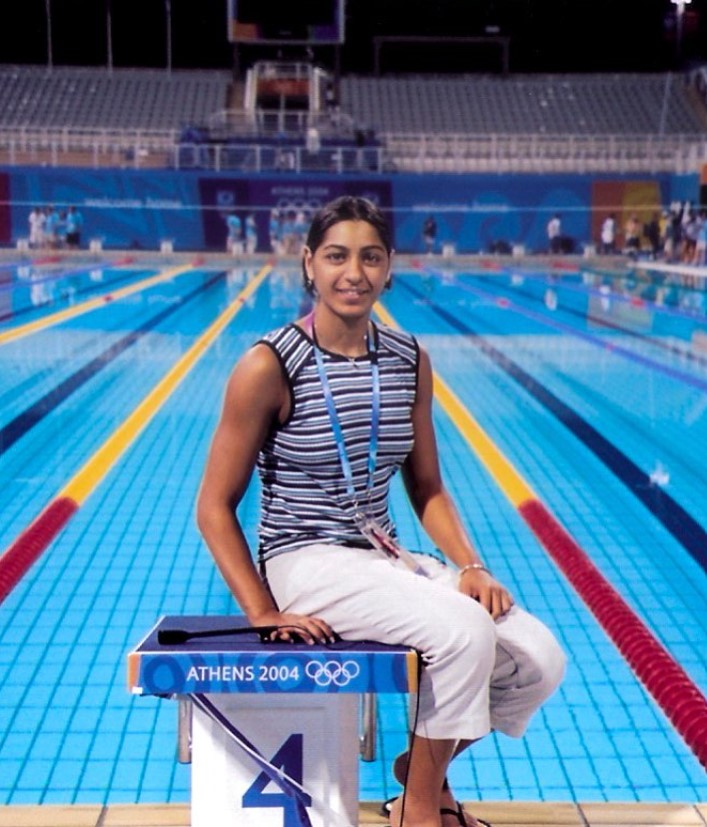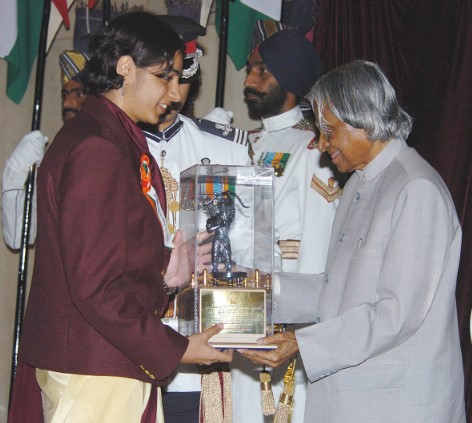(May 22, 2024) An Olympian and Arjuna awardee, Shikha Tandon is a champion swimmer who created 75 national records, won 146 national medals, and 37 medals in international competitions, including five golds. The swimmer-turned-biotechnologist serves as the Chief Resilience and Partnership Officer of USA based AI-powered physical training and human performance intelligence company, Svexa. Shikha is also an advisory board member of Bridges of Sports Foundation, a nonprofit creating a sustainable sports ecosystem impacting social development through sports in rural and semi-urban India.
Growing up, no one would have believed that the quiet girl, who was afraid even of dipping her feet in the water, would become India’s fastest ever female swimmer. “My journey into competitive swimming was anything but passion. It wasn’t out of choice. It was out of a series of comedies and opportunities,” Shikha Tandon said in a TEDx talk. Although she was a shy child, she was active and liked being around people, she shared.
During the summer, her family and friends used to go to the swimming pool every week, and while her friends jumped in and out of the water, having a great time, Shikha preferred to stand at poolside, dipping her fingers into the fountain. This happened week after week during the summer months.

Shikha Tandon
When she was six, one family friend, in an attempt to help her get rid of her fear of water, took her into the pool. “The minute I got into the water, I started flailing my arms and kicking my legs and doing everything possible to get out of the pool. One of those breaststroke drop kicks landed on the person’s arm and he immediately let me go. But he looked up at my mom and jokingly said, ‘Shikha has a very strong breaststroke kick. Someday she will make a great swimmer.”
Her mother held on to this comment, although at that moment, sole focus behind Shikha’s strong breaststroke kick was to get as far away from the swimming pool as she could. After that incident, being an athletics-inclined kid, Shikha tried her hand at sports like roller skating and running. However, destiny had other plans.
Destiny unfolds
Two years later, her brother was diagnosed with severe asthma and used to be hospitalised every few months. The doctor recommended that he take up swimming regularly to help improve his lung capacity. Since Shikha couldn’t be left at home, her mother took her along to the pool. Two years after that initial kicking incident, it was Shikha’s first time back at the swimming pool. On the first day, her brother was extremely excited and even jumped into the pool with his socks on. “I, on the other hand, took my time, but by the end of that first session, I was comfortable. Clearly, something had changed in those two years,” she recalled.

Shikha Tandon receiving Arjuna Award from foremer President of India, late Dr. A.P.J. Abdul Kalam in 2005
One thing led to another, and the next year, at the age of nine, Shikha won her first national medal in the 50-meter breaststroke. “I guess the kick was strong after all,” she smiled. Shikha started representing India at international events when she turned 12. “At the age of 13, I was the fastest swimmer in India in my event, and at the age of 19, I was the only swimmer to represent India at the 2004 Athens Olympics,” adds the Olympian and Arjuna awardee.
Looking back, the memory Shikha holds dearest to her heart is the feeling she experienced at the Olympics opening ceremony, walking alongside her teammates, behind India’s national flag. “Those emotions are very hard to describe. For an athlete, being able to represent your country at the Olympics is the pinnacle of your career,” the Global Indian remarked, adding, “The Olympics are unlike any other event. You are there with 10,000 athletes from all over the world, each one is the best in their respective sports. All these athletes are living together, eating together, competing together, making friendships, and building memories. That’s something I have not seen or witnessed anywhere else.”
From swimming to biosciences
Shikha had a thriving 15-year career in swimming before she decided to end her competitive swimming journey. Although she stopped competing, her passion for the sport did not wane. As an athlete, she was always interested in the inner workings of the human body, which led her to the biosciences. She had always remained interested in academics while competing as an elite swimmer, and was also enrolled at the Bangalore University, from where she graduated with a bachelor’s and master’s in biotechnology.
In 2009 Shikha moved to the US for a second master’s in biology from the Case Western Reserve University while also remained engaged in professional swimming until 2010.

Shikha Tandon
“I was always an advocate for clean sport and preserving the integrity of hard work. So, when I passed out from college in the US, I went on to work at the US Anti-Doping Agency on their science team. This was exceptionally exciting for me because I was one of a handful of kids from all over the world given the opportunity to be directly involved in the global anti-doping movement,” she said.
AI innovation and sports
Following a five-year stint working as a science program lead at the US Anti-Doping Agency (USADA), Shikha worked at a couple of fitness startups (Moov Inc, Repmonk AI) and at TechCrunch as a product manager before joining Silicon Valley Exercise Analytics (Svexa).
At Svexa, she serves the Chief Resilience and Partnership Officer working on a team intentionally composed of members with dual competencies – both technical and athletic. In the five years of association with the organisation she has climbed up the hierarchical ladder from National Lead – Business, Director – Global Partnerships to her current role. Svexa’s employees include numerous current and retired athletes who have competed professionally as well as at the Olympic and Paralympic Games.

Shikha Tandon
“What we’re trying to do is a combination of AI and human domain expertise, which a coach typically brings,” Shikha said. “We use all the data that we have to keep people in optimal zones in terms of performance, recovery, taking into account their goals,” she shared with the Sports Business Journal. In her role she has worked with several elite athletes and has helped them structure and modify their training regimes for their peak performances.
“I think having access to this kind of (AI based performance optimizer) before my retirement would have helped me potentially elongate my career a little more because I started getting injured quite a bit towards the end. So, I think from an injury prevention or management standpoint, it could have helped. Also from a training perspective, it would have kept me in my optimal zones,” remarked the ace swimmer talking about how of late AI is a boon for sportspeople.
With loads of insights and a fulfilling career as a former athlete and corporate executive in the AI-powered sports world, Shikha is leading a fulfilling life in the US with her husband and her two little girls.

Shikha Tandon with her family




